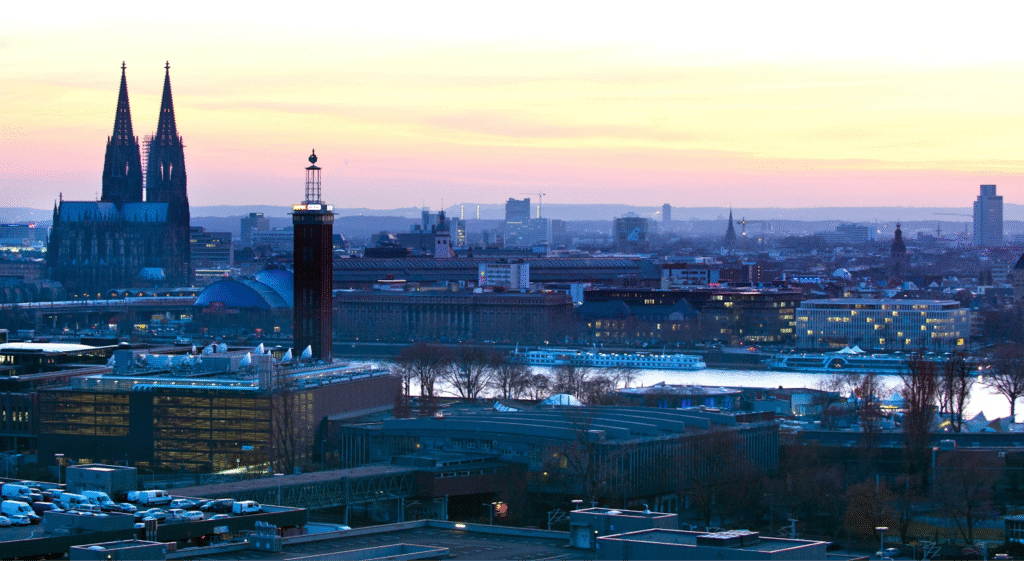🇩🇪Ready to start a new adventure across the Channel? If you’re planning a move to Cologne, this guide will give you all the practical steps, updated costs, and streamlined advice you need for a smooth transition.
What should I know about living in Cologne at a glance?
- Flag: 🇩🇪
- Population: 1.15 million
- Currency: Euro (EUR) Average salary: between Between €52,000 and €55,000 per year
- Live EUR ←→ Dollar: Use dynamic currency converters for the latest exchange rates (Destatis, 2024 ; European Central Bank, 2024 ; XE, 2024)
Reviewed by the German Federal Statistical Office, June 2025; European Central Bank Monetary Policy Department, last updated in July 2025; XE Financial Data Team, last updated in July 2025.

How much does it cost to move door-to-door to Cologne?
The cost of moving to Cologne depends on shipment size and transport method. Typical market rates as of mid-2025 are:
| Move Type | Time | Cost (EUR) |
| 20 ft container | 2–4 weeks | €2,500–3,500 |
| 40 ft container | 2–4 weeks | €3,000–4,200 |
| Air freight (1 m³) | 6–10 days | €700–950 |
| Customs Fees | — | €150–400 |
Reviewed by the Freightos Market Analytics Team, last updated in July 2025
Use a real-time moving calculator for tailored quotes with ReloAdvisor.
Real-life case:
“I moved to Cologne in May 2025 with around 34 cubic meters of personal belongings using a 20ft container from Amsterdam. The total cost—including inland trucking, sea freight, and customs clearance—was approximately €2,700, and the container arrived in just over two weeks. I worked with a small relocation agency based in Cologne, and they helped me handle all paperwork and liaised with customs, which really made the process stress-free.”
— Maarten V., moved in May 2025
Importantly, many people moving to Germany choose to relocate to one of the five biggest cities in the country, including Berlin, Munich, Frankfurt, and Hamburg.These cities offer diverse job opportunities, excellent infrastructure, and vibrant international communities, making them popular destinations for expats from the Netherlands and beyond.
What are the customs and duty rules when moving belongings?
When relocating to Germany, you may qualify for duty-free import of used personal goods under Transfer of Residence rules, provided items have been owned and used for over 6 months. You’ll need to submit a customs declaration (Form 0350) and provide documents like your residence registration and inventory list.
New or commercial goods are subject to import duties and VAT (typically 19%). To avoid delays and charges, ensure declarations are complete and submitted before arrival.
Reviewed by German Customs (Zoll), last updated in February 2025.
Real-life case:
“When I moved from Toronto to Berlin, I completed the customs forms before shipping. Thanks to Germany’s Transfer of Residence policy, my used belongings cleared customs smoothly without extra fees.” — Mark R.
What is the cost of living in the Cologne?
A one‑bedroom flat in Cologne averages €1,030 per month, while groceries cost around €260 per month. Transport and utilities are comparable, with utilities averaging approximately €300 per month. These figures reflect city-level average living costs for a single occupant and are updated quarterly using data from industry sources.
| Expense | Cologne (EUR/mo) |
| Rent (1‑bedroom flat) | €1,030 |
| Groceries | €260 |
| Transport (monthly pass) | €49 |
| Utilities | €300 |
Reviewed by Numbeo Data Quality Team,last updated in July 2025

What do I need to know about Cologne visas and residency?
A German visa is required for most non-EU nationals, options include the EU Blue Card, work visas for qualified professionals, family reunion visas, and student visas.
- Visa categories and check: https://www.make-it-in-germany.com/en/visa-residence/types
- Visa application portal: https://digital.diplo.de/Visa
Reviewed by the German Federal Foreign Office Visa Policy Division and Make‑it‑in‑Germany experts, last updated in June 2025
How can I bring pets with me to Cologne?
Pets entering Germany must be microchipped, vaccinated against rabies, and accompanied by a valid EU pet passport (for EU countries) or an official veterinary health certificate (for non-EU countries). Certain breeds and exotic animals may have import restrictions.
If arriving from outside the EU, notify German Customs in advance. Using a certified pet relocation service and starting preparations early ensures compliance and reduces stress for both owner and pet.
Reviewed by Federal Ministry of Food and Agriculture (BMEL), last updated in March 2025.
What’s required to import a car or swap a driving licence?
Imported vehicles must be declared at customs. If you’re arriving from outside the EU, VAT and import duty may apply unless you qualify for Transfer of Residence relief. The car must pass a TÜV inspection to meet German safety and emissions standards before registration.
EU licences are generally valid in Germany. If you hold a non-EU licence, you must exchange it within 6 months of registering your German residence. The process depends on your country of issue and may include a theory or practical test.
Reviewed by Kraftfahrt-Bundesamt (KBA), last updated in July 2024.
How do I open a bank account and get a Cologne’s social security number?
To open a German bank account, you’ll need valid photo ID (passport), proof of address (Anmeldung), and often a residence permit. Most banks offer accounts tailored for newcomers and may support English-language services.
After registering your address at the local Bürgeramt, you’ll automatically receive a Tax Identification Number (Steuer-ID) by post. This ID is essential for employment, taxation, and public services.
Reviewed by Bundeszentralamt für Steuern and Deutsche Bundesbank, last updated in November 2024.
How to Access Healthcare and Insurance Options in Cologne?
Germany has a top-tier healthcare system, and health insurance is mandatory for all residents. Most people are covered by public health insurance (GKV), which is income-based and includes doctor visits, hospital care, and prescriptions. You’ll share the cost with your employer, and receive a health card once registered.
If you earn above a certain amount or are self-employed, you can opt for private health insurance (PKV), which may offer faster appointments and broader coverage.
Alongside health insurance, you’ll also contribute to other social insurance schemes: pension, unemployment, and long-term care. Make sure to register for health insurance as soon as you arrive.
Reviewed by Federal Ministry for Economic Affairs and Climate Action (BMWK)

How to Navigate the Housing Market as a Newcomer to Cologne?
Renters in Cologne typically pay a security deposit equal to three months of cold rent (“Kaltmiete”), which excludes utilities. To secure a rental, you’ll need to provide key documents such as proof of income, a SCHUFA credit report, a copy of your ID or residence permit, and sometimes references from previous landlords.
If you’re looking to buy property in Cologne, budget for extra costs like notary fees, land registry charges, and property transfer tax (6.5% in NRW). These expenses usually add up to 10–15% of the purchase price.
Popular residential areas for newcomers in Cologne include:
- Belgisches Viertel – Trendy and central, with art galleries and cafés
- Ehrenfeld – Diverse and creative, popular with students and expats
- Sülz – Green, quiet, and family-friendly
- Deutz – Riverside views, great transport links, and growing business hubs
Each area has a distinct feel, with solid public transport and access to Cologne’s cultural life.
Reviewed by Immobilienscout24 and WG-Gesucht Market Insights, last updated in March 2025.
How to Understand Your Tax and Pension Obligations in Cologne?
If you’re a resident in Germany for more than 183 days or register your address, you’re taxed on worldwide income. Contributions to social security (including pension) are mandatory. Germany also has double taxation treaties to prevent being taxed twice on the same income abroad.
| Tax Component | Description | Notes |
| Income Tax | On global income | Progressive rates: 14%–45% |
| Social Contributions | Covers pension, healthcare | Shared by employer and employee |
| Double Tax Treaties | Avoid double taxation | Agreements with 90+ countries |
Reviewed by the German Federal Ministry of Finance, last updated in April 2025.
Where can I find tools and more resources before moving?
For further guidance, make use of the volume calculator, book a video survey, or explore comprehensive guides for Spain and Austria with ReloAdvisor.



